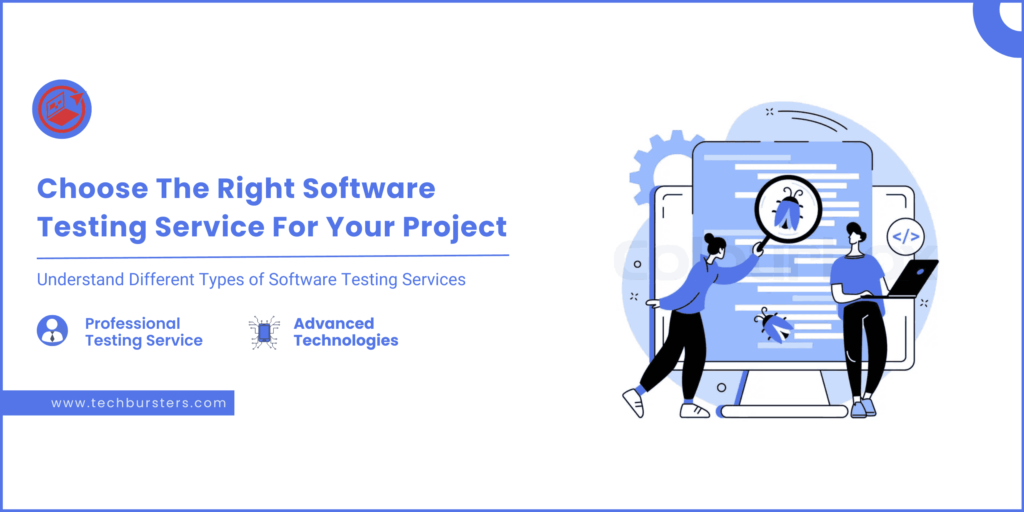
Did you know the software testing market will skyrocket to $109.5 billion by 2027? This fact underscores the significant role it plays in our current digital world. Testing is the key to good application quality, dependability, and function.
It helps improve the user’s experience, lowers expenses, and decreases hazards. In this age of digital change, robust testing plans give a winning edge. Regardless, choosing the correct partner for software testing can be tricky.
Businesses need to tackle challenging aspects like getting to grips with various testing services, matching abilities to project requirements, and weighing up different methods and instruments. When facing these difficulties, it’s vital to pick a testing service systematically. Here’s how to do so.
Understand Different Types of Testing Services
1. Functional Testing
Functional testing checks if a software program fulfills its defined obligations. It includes various methods:
- Manual Testing: This method involves human testers carrying out test scenarios without automatic help. Although exhaustive, it might be lengthy and lead to human mistakes.
- Automated Testing: This method uses scripts and tools for testing automatically. It boosts efficiency and reliability. Yet, it requires an early investment in automation tools.
- Checking Software: The testers check out the program without using pre-set test steps. They depend on their gut feelings and past experience.
These strategies have pros and cons, so picking the right one for your project’s requirements is vital. When choosing software testing services, it’s crucial to consider which methods best align with your project’s specific needs and constraints.
2. Non-Functional Testing
Non-functional testing looks at parts that go past the usual needs, like how they performs, their safety, and ease of use. These parts are essential to ensure the app is complete and does what users want.
A) Performance Testing
Performance testing checks how an app performs under different situations, such as load and stress cases. Tools such as JMeter or LoadRunner are often used to mimic many users and spot trouble areas.
B) Security Testing
Security testing aims to find software weaknesses. It uses methods like penetration testing and vulnerability scans, which are essential due to increasing cyber threats. Spending on cybersecurity is expected to exceed $87 billion, highlighting the vital importance of thorough security checks.
C) Usability Testing
Usability testing checks if apps are simple and easy for the user. It usually involves actual people using the app as others watch and identify challenging parts. Proper usability tests can greatly enhance user happiness and the general success of the product.
D) Automated Testing
Software testing automation has lots of benefits. It increases work output, reduces costs, and sharpens accuracy. Smart automation systems for testing can smooth out the product’s life cycle.
By eliminating repetitive tasks, automation allows teams to focus on addressing complex challenges and improving the overall product. Advanced tools like Momentic AI test automation software play a role in enhancing efficiency by identifying errors and streamlining workflows. This contributes to faster release cycles and ensures consistent quality throughout the software development process. Ultimately, automated testing supports a more efficient and error-resistant lifecycle for any project.
E) Data Testing
It is crucial to have correct data in a decision-making app. Test tools that work automatically verify this accuracy. They warrant that heaps of information function rightly within systems.
Businesses can utilize these tactics to manage their test data needs, thus reducing laborious efforts. For example, automated data verification can identify divergences during the early production phases, preventing expensive errors.
Good to Read:- IT & Software Companies in Visakhapatnam & Vizag
Key Factors to Consider When Choosing a Testing Service
Choosing a software testing service requires careful thought. Important decisions revolve around you:
1. Project Specifications
It’s important for the service you select to suit the specific needs of your project. Think about aspects such as the scope of the project, its complexity, and due dates when you are looking at potential partners.
2. Service Offerings
A wide array of offerings — like UI checking, API testing, speed evaluation, and safeguard analysis — supports enough quality control throughout each stage of creation.
3. Technology and Tools
The tech devices used by our service team need to work seamlessly with the current Continuous Integration/Continuous Deployment (CI/CD) systems to improve performance. Modern tools that are beneficial can easily integrate with evolving approaches.
4. Expertise and Experience
Checking the service provider’s business knowledge guarantees better results. A qualified team with the right skills can supply top-notch solutions based on the project’s requirements.
Advantages of Partnering with a Professional Testing Service
1. Cost Reduction
These services contribute to considerable cost savings in QA operations. They minimize the time spent on manual tasks and reduce errors.
2. Quality Assurance
Professional services ensure excellent quality by using regular techniques that maintain high standards across all variations.
3. Scalability and Flexibility
Testing services offer expansion possibilities catered to project requirements. It assists businesses in adapting quickly while still maintaining high standards.
4. Testing Center of Excellence (TCoE)
Setting up a TCoE can make procedures more efficient and boost team cooperation. Experienced services provide essential skills and structures to support this plan.
Leveraging Advanced Technologies in Testing
Integrating high-tech systems such as Artificial Intelligence (AI) and Machine Learning (ML) improves productivity in software testing.
- AI/ML: These technologies take over repetitive jobs and heighten the precision of creating test cases.
- Service virtualization: This lets groups mimic needs throughout the making process. It paves the way for complete API checks while speeding up the cycles.
With the use of these high-tech tools, businesses can greatly enhance their software testing methods. It lets them stay updated with changing market needs.
Good to Read:- Top IT & Software Companies in Jaipur
Conclusion
Selecting a top-notch software testing service is critical to a project’s success. Companies must grasp the importance of efficient testing methods and assess future partners based on specific criteria: project needs, services provided, technical compatibility, and skill. Paying attention to these factors will improve product standards and massively help in pleasing customers and expanding the business.
